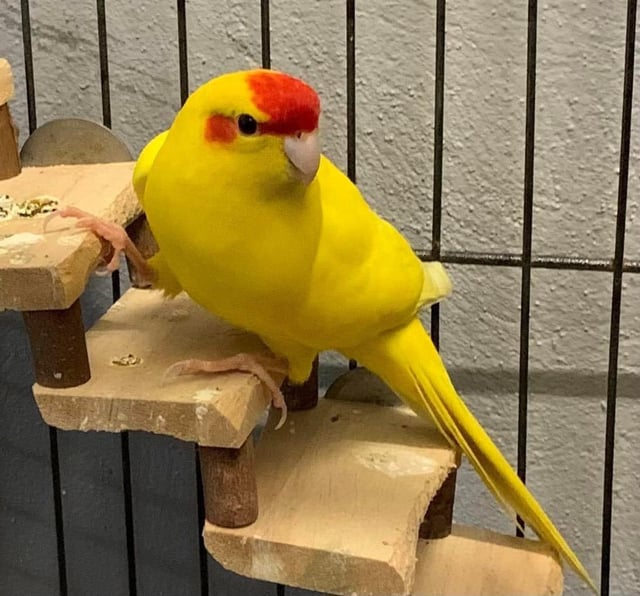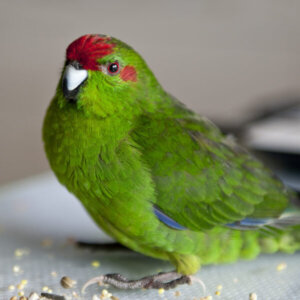Can Kakarikis Live Alone: Ensuring a Happy and Healthy Bird
Kakarikis can live alone, but it is not ideal for them. These social birds thrive better with company.
Kakarikis, also known as New Zealand parakeets, are charming and active birds. They are known for their playful nature and love for interaction. While it is possible to keep a Kakariki alone, they can become lonely and bored. These birds need mental stimulation and social engagement to stay happy and healthy.
If you have only one Kakariki, you must spend a lot of time with it. Understanding their social needs is essential for their well-being. This post will explore whether Kakarikis can live alone and how to ensure their happiness if they do.
Introduction To Kakarikis
Kakarikis are lively parrots known for their energetic behavior. They thrive on social interaction and companionship. Keeping a Kakariki alone may lead to loneliness and stress.
Kakarikis are vibrant and curious birds. They originate from New Zealand and are known for their active nature. These birds are often called “Kakariki” which means “small parrot” in the Maori language. They are small, colorful, and full of energy. Their playful behavior makes them entertaining pets. Many bird enthusiasts are drawn to their unique characteristics. Understanding more about their origin and traits can help you care for them better.Origin And Characteristics
Kakarikis come from New Zealand. They belong to the parrot family. Their feathers are typically bright green with red patches on their head and wings. Some have yellow feathers too. They are small birds, usually around 11 inches in length. Their bright colors and lively nature make them stand out. Kakarikis are known for their intelligence. They can learn tricks and mimic sounds. They are also very active and need a lot of space to move around.Popularity As Pets
Many people love having Kakarikis as pets. Their friendly and curious nature makes them great companions. They enjoy interacting with humans and other birds. This makes them an ideal choice for bird lovers. Kakarikis are relatively easy to care for. They are hardy birds and can adapt to various environments. Their playful behavior can bring joy to any household. Owning a Kakariki can be a rewarding experience. “`
Credit: www.reddit.com
Social Nature Of Kakarikis
Kakarikis are known for their lively and friendly nature. These small parrots thrive on social interaction and companionship. They are inquisitive and often seek the company of their owners or other birds. Understanding their social nature is key to keeping them happy and healthy.
Interaction With Other Birds
Kakarikis enjoy interacting with other birds. They are not aggressive and can coexist with various bird species. In fact, they often form strong bonds with their cage mates. This makes them ideal for aviaries with multiple birds.
When housed with other birds, Kakarikis engage in playful activities. They share food and toys, and they communicate through chirps and calls. These interactions keep them mentally stimulated and physically active.
Behavioral Traits
Kakarikis display several unique behavioral traits. They are known for their curiosity and intelligence. They love to explore their environment and often mimic sounds they hear.
These parrots are also very active. They enjoy climbing, hopping, and flying around their enclosure. Providing them with a variety of toys and perches helps satisfy their need for activity and exploration.
Due to their social nature, Kakarikis can become lonely if kept alone. They may develop behavioral issues such as feather plucking or excessive screaming. Ensuring they have companionship or plenty of interaction with their owner can prevent these issues.
Risks Of Keeping Kakarikis Alone
Kakarikis, when kept alone, may experience loneliness and stress. These intelligent birds thrive on social interaction and mental stimulation. Without companionship, they might develop behavioral issues or depression.
Kakarikis are social birds. Keeping them alone poses many risks. These bright birds thrive with company. Isolation can lead to many issues.Loneliness And Boredom
Kakarikis need interaction. Without it, they feel lonely. Loneliness leads to boredom. Boredom can make them unhappy. Unhappy birds might become destructive. They may peck at their feathers. They might also scream more often.Health Implications
Mental health affects physical health. Lonely Kakarikis may eat less. They might gain weight or lose it. Stress weakens their immune system. They can get sick more easily. A healthy bird needs a happy mind. Keeping Kakarikis alone is risky. They need friends. Their well-being depends on it. “`
Credit: m.facebook.com
Signs Of A Lonely Kakariki
A Kakariki’s well-being depends on social interaction and stimulation. Loneliness affects their mental and physical health. Understanding the signs of a lonely Kakariki helps you provide the care they need. Here are some key indicators:
Behavioral Changes
Lonely Kakarikis often show noticeable behavioral changes. These changes are a cry for help.
- Increased Aggression: A lonely Kakariki might become more aggressive.
- Excessive Screaming: They may scream more than usual.
- Feather Plucking: Some Kakarikis start plucking their feathers.
- Loss of Appetite: They might eat less or refuse food.
- Lethargy: A lonely bird may seem tired and less active.
Physical Symptoms
Loneliness in Kakarikis can lead to physical symptoms. These symptoms are often visible and concerning.
| Symptom | Description |
|---|---|
| Weight Loss | A lonely Kakariki may lose weight quickly. |
| Poor Feather Condition | Feathers might look dull, damaged, or sparse. |
| Frequent Illness | They might get sick more often due to stress. |
| Self-Harm | Some birds might harm themselves due to stress. |
Addressing these signs early ensures your Kakariki stays happy and healthy. They need social interaction and mental stimulation to thrive.
Creating A Stimulating Environment
Kakarikis are lively and intelligent birds. They need a stimulating environment to stay happy. Keeping a Kakariki alone means you must provide extra care. This ensures they remain mentally and physically active. A stimulating environment can prevent boredom and loneliness.
Enrichment Activities
Enrichment activities are crucial for a Kakariki’s well-being. These activities keep their minds sharp and bodies active. Provide a variety of activities each day.
- Foraging – Scatter food around their cage. This encourages natural foraging behavior.
- Training – Teach simple tricks. Use positive reinforcement like treats.
- Playtime – Allow supervised out-of-cage time. This gives them a chance to explore.
Rotate activities to keep their interest. This prevents them from getting bored.
Safe Toys And Accessories
Toys and accessories are important for a Kakariki’s mental health. They offer stimulation and help to prevent destructive behaviors.
| Toy Type | Benefits |
|---|---|
| Chew Toys | Good for beak health. |
| Swings | Encourages physical activity. |
| Mirrors | Provides company. |
Make sure the toys are safe. Avoid any with small parts that can be swallowed. Regularly check for wear and tear.
Accessories like ladders and perches are also essential. They provide variety and help with exercise. Place them at different heights to encourage climbing.
Creating a stimulating environment for your Kakariki is not just about fun. It is about their overall health and happiness.

Credit: m.facebook.com
Alternatives To Companionship
While Kakarikis are social birds, they can live alone with the right care. If you cannot provide a feathered friend, there are other ways to ensure they stay happy and healthy. Let’s explore some alternatives to companionship for your solo Kakariki.
Human Interaction
Your Kakariki will need plenty of human interaction. Spend time with your bird each day. Talk to them, sing, and even dance. They love the sound of your voice. You can also teach them simple tricks. This will keep their minds active and build a stronger bond.
Scheduled Playtime
Another great alternative is scheduled playtime. Set aside specific times each day for play. Use a variety of toys to keep them engaged. Rotate toys regularly to maintain their interest. Puzzle toys, bells, and swings are excellent choices. Make sure to supervise playtime to ensure safety.
| Activity | Benefit |
|---|---|
| Talking and Singing | Keeps them mentally active |
| Teaching Tricks | Strengthens your bond |
| Variety of Toys | Prevents boredom |
| Supervised Play | Ensures safety |
- Rotate toys to maintain interest
- Ensure supervised playtime for safety
- Use puzzle toys to challenge their minds
Importance Of Proper Nutrition
Proper nutrition plays a crucial role in the health and well-being of Kakarikis. A balanced diet ensures they receive all the necessary nutrients for their growth, energy, and overall health. Neglecting proper nutrition can lead to various health issues, affecting their quality of life.
Balanced Diet
A balanced diet for Kakarikis includes a mix of seeds, fruits, vegetables, and pellets. Seeds such as millet, sunflower, and safflower should be part of their diet. However, seeds alone are not enough.
Fresh fruits and vegetables are vital. Offer them apples, carrots, spinach, and broccoli. These provide essential vitamins and minerals. Pellets are also important. They are formulated to provide a complete diet. They should make up around 60% of their food intake.
Supplemental Needs
Sometimes, Kakarikis may need additional supplements. Calcium is crucial for their bones. Provide cuttlebone or mineral blocks in their cage. Vitamin supplements can also be added to their water. This ensures they get all the necessary nutrients.
Here is a quick reference table for the dietary needs of Kakarikis:
| Food Type | Examples | Percentage of Diet |
|---|---|---|
| Seeds | Millet, Sunflower, Safflower | 20% |
| Fruits | Apples, Berries | 10% |
| Vegetables | Carrots, Spinach, Broccoli | 10% |
| Pellets | Commercial Bird Pellets | 60% |
Ensure fresh water is always available. Clean their food and water dishes regularly to prevent infections.
Regular Health Check-ups
Regular Health Check-ups are vital for the well-being of your Kakariki. Regular assessments help catch health issues early. Early detection means better chances of recovery and a healthier bird. Here are some important aspects of maintaining your Kakariki’s health.
Veterinary Visits
Regular veterinary visits are crucial for your Kakariki. A vet can identify problems you might miss. Schedule appointments at least twice a year. During the visit, the vet will check:
- Weight
- Feathers and skin condition
- Beak and claws
- Respiratory health
If your bird shows signs of illness, visit the vet immediately. Signs include changes in eating habits or behavior.
Monitoring Health At Home
At home, you should regularly monitor your Kakariki’s health. Watch for any changes in their behavior. Keep an eye on their:
- Appetite
- Feather condition
- Droppings
- Activity levels
Any sudden changes could indicate a health issue. Keep their living environment clean. Provide a balanced diet with fresh fruits and vegetables.
Regular health checks ensure your Kakariki stays happy and healthy. This helps them live a long and joyful life.
Frequently Asked Questions
Can Kakarikis Live Alone Happily?
Kakarikis can live alone, but they thrive better with companionship. They need interaction, stimulation, and socialization to stay happy and healthy.
How Much Attention Do Kakarikis Need?
Kakarikis need daily attention to prevent loneliness. Spend at least 1-2 hours interacting with them to keep them engaged.
Are Kakarikis Social Birds?
Yes, Kakarikis are social birds. They enjoy interacting with their owners and other birds, needing social engagement to stay content.
What Happens If Kakarikis Are Left Alone?
If left alone, Kakarikis can become bored and stressed. This can lead to behavioral issues and health problems over time.
Conclusion
Living alone can be tough for Kakarikis. They thrive with companionship. Loneliness may cause stress and behavioral issues. Consider getting a second bird. This can improve their well-being. Social interaction keeps Kakarikis happy and healthy. Always monitor their behavior. Ensure they bond well.
A happy Kakariki is a joyful pet. Choose wisely for their sake. Your Kakariki deserves the best care.
Hello Dear, I'm Poli Kolymnia, owner of many birds (including budgies).
With a deep passion for these feathered companions, I'm here to share my expertise and extensive knowledge on birds care.
My articles cover essential topics like diet, housing, care, and health, providing practical tips to help you create a happy and thriving environment for your birds.






